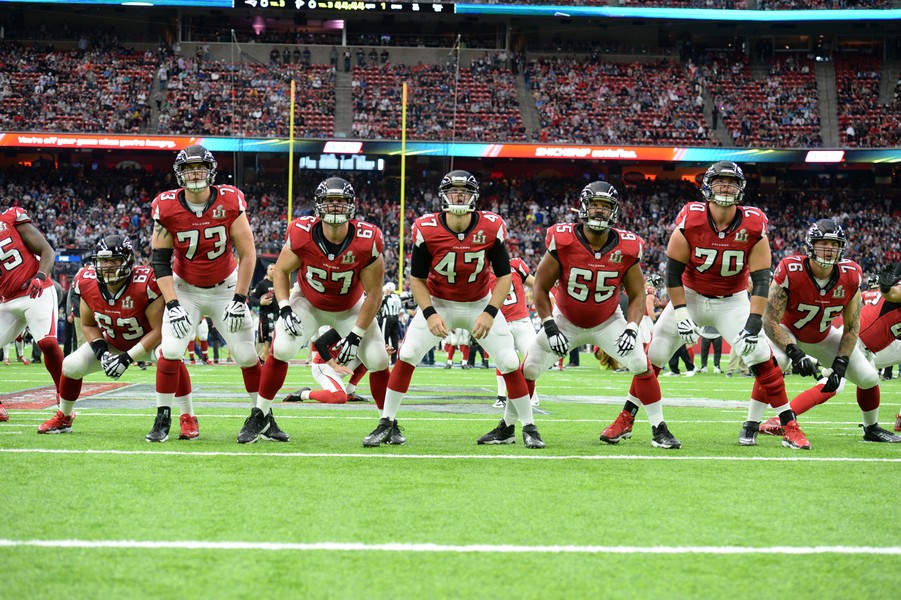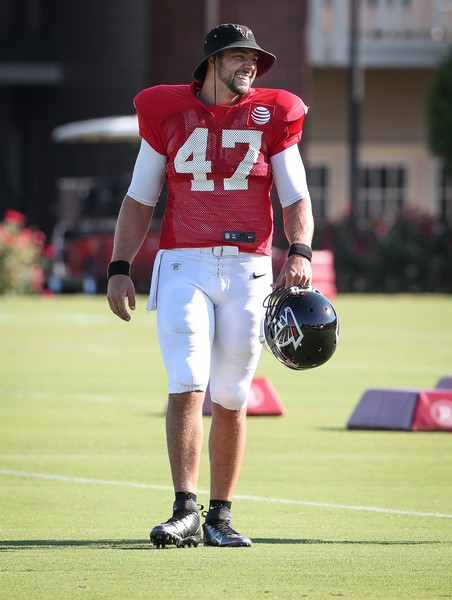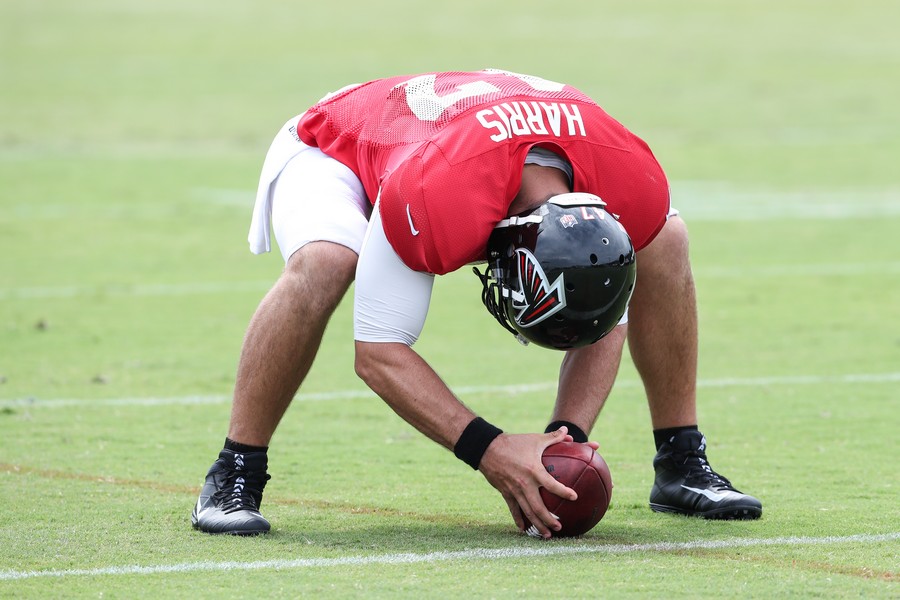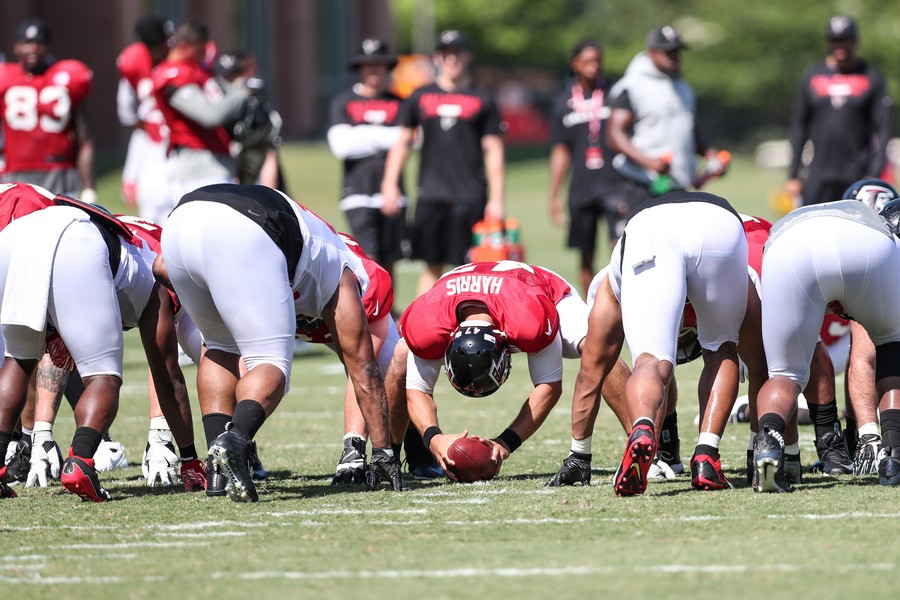Features
The initials that indicate football positions are fairly well known. QB for quarterback and LB for linebacker. DE for defensive end and WR for wide receiver. P for punter and K for kicker. But if you want a good way to stump some folks ask them what LS stands for.
And if you want a good way to irritate some youth players, ask them to fill the overlooked position.
“Typically, the long snapper isn’t something anyone aspires to be,” says the Atlanta Falcons’ Josh Harris (Auburn). “I have no idea why my Pop Warner coach picked me. Frankly, I wasn’t thrilled when he said I was going to be the long snapper. He demonstrated it one time and I got down into that stance and tried to throw the best spiral I could.
“Now I’m very thankful he put me in that position.” Harris has much to be grateful for. Perfecting the art of snapping footballs up to 15 yards through his legs allowed him to experience two childhood dreams. That’s two more than he imagined possible as he left high school for college.
Harris was a three-sport athlete, a wrestler who played football and baseball in Carrollton, Ga., about 45 minutes west of Atlanta. He didn’t garner much interest as a linebacker and defensive end. But one of his assistant coaches realized Harris had a gift for snapping and suggested that he walk on at a major college.
Choosing the school was easy because he grew up as a huge Auburn fan. A slew of relatives had attended, including his grandfather James Morrow, a member of Auburn’s 1957 national championship team. Still, Harris wasn’t crazy about the idea.
“If I was going to play football, I wanted to play a real position,” he said. “But the more I thought about it, the more I realized it was my best shot realistically. I’m not the biggest, fastest, strongest guy out there but I could snap. I figured the worst that could happen was they’d say no.”

The next-to-worst thing was they’d say nothing at all. That appeared to be the case initially when Harris attended the walk-on tryout in 2007. He snapped 15-20 times in front of coaches and they said they’d get back to him. When he didn’t hear from them within a few weeks, he took their silence as rejection and moved on with his life.
The first step was joining Sigma Nu.
Harris had friends who had joined and he enjoyed hanging out with them at different events. He felt like he fit in well with the guys and the Fraternity overall. So, he decided to become a candidate and began the journey toward initiation. A little more than halfway through the process, a coach called and asked if Harris had been snapping. He responded with an untruth.
“I said, ‘Of course.’ I had been waiting on that call forever,” Harris says. “I bought some footballs, grabbed one of my fraternity brothers, Clayton Howard, and went to the intramural field to make sure I could still do it.” The skill hadn’t escaped him.
A few days later, Harris was a candidate AND a member of Auburn’s football team. Pulling off either feat while juggling classwork is impressive enough, but doing them simultaneously is a whole different level. Harris managed to attend most fraternity events while he finished candidacy, living the best of two worlds.
“One of the coolest things was experiencing game day,” he says. “I got the experience as a student, as a candidate and then as a player. Doing all of that during a short time frame was pretty neat. I still went through the process of becoming a brother like everyone else. I wouldn’t say I got favorable treatment, but it was really cool. My chapter brothers were excited for me and excited to share that experience.”
Harris says the candidate process helped him adjust quicker to being a Division I football player. He was used to having responsibilities beyond the typical college student. There were places to be and responsibilities to complete outside the classroom. There was no scheduling late classes and sleeping in. Once on the team, Harris put those time-management skills to work, throwing practice, meetings and weight lifting into the mix.
He redshirted that year, served as the backup in 2008 and became the starter in 2009. He earned a scholarship for the 2010 season and appeared to write a storybook ending when Auburn went undefeated and won the national title. Harris played a crucial role in the championship game, delivering a perfect snap on the winning field goal with two seconds left.
“It’s hard to put that year into words, it means so much,” he says. “While I played on the team, part of me still felt like a fan. I wasn’t just there to play football but I genuinely cared about the success. To win a championship is incredible but to win it all at Auburn meant even more to me, especially since it was the only one besides 1957. My grandfather passed in 2004 but it was cool to share it with them.”
Preparing to put football behind him, Harris studied for the LSAT and planned to attend law school. But the ability he displayed during his senior year opened another possibility: NFL paychecks. He was invited to the Senior Bowl. He was the lone long snapper at the scouting combine. Entering the 2012 draft, Harris was the top-rated specialist at his position. He wasn’t selected – teams rarely use a pick for that position – but the Atlanta Falcons called and signed him as an undrafted free agent.
How’s that for a double-play?

Harris went from playing for his childhood college team to being in training camp with his childhood NFL team. He was close to home, family and friends. But he had to make the roster, which wasn’t a given with 13-year veteran Joe Zelenka standing in the way. It was no big deal, though, just like when scholarship player Dax Dellenbach temporarily blocked Harris’ path at Auburn.
Harris’ experience as a high school wrestler – he won his area twice and was fourth in the state as a junior – has always worked to his advantage. Coaches noted his athleticism and ability to get downfield and make tackles. “It’s a great sport and taught me a lot about myself physically and mentally,” he says. “I didn’t realize it’d carry over to football but it has a lot of similarities. Not just from a toughness mindset but understanding the easiest way to get a guy to the ground. I know how to take a leg out.”
The learning curve with Atlanta was steep. It covered different rules – NFL long snappers must block on punts before running downfield – and a different lifestyle. Football went from being an extracurricular activity to being a means of providing food, clothing and shelter. Instead of studying and practicing a few hours per day, the sport consumed virtually every waking hour.
“Your whole life is devoted to the game,” he says. “Every week during the summer, training camp, whatever. It’s not easy. People see the games and the contracts but that’s not what it’s all about. You go to work to make yourself the best long snapper you can be and the other guys to be the best they can be at the positions they play. I love it. I think it’s fantastic. It’s an opportunity to make a living doing something I’ve loved since I was a child.”
Harris says there was at least one similarity between Auburn and the NFL: He wasn’t hazed as a candidate and he wasn’t hazed as a rookie. “The hardest thing may’ve been buying dinner for the kicker and punter.”
If his career continues on its present track, he’ll see another decade worth of rookies. Long snapper is a position built for longevity, provided performance doesn’t slip. Former San Diego Chargers LS David Blinn lasted 17 years. Patrick Mannelly snapped for the Chicago Bears for 16 seasons. Teams love to hold on when they find a good one.
Harris was reliable and durable during his first three seasons with Atlanta, handling all hikes for punts and place-kicks while never missing a game. The Falcons rewarded him with a four-year, $3.4 million contract extension in 2014, including a $400,000 signing bonus. “Josh has been a very solid snapper for us in both field goals and punts,” then-Atlanta coach Mike Smith told reporters that day. “When you’ve got a guy that can do that trade, you want to try to keep him around as long as you can.”

He outlasted Smith, who was replaced by Dan Quinn the following year. The Falcons went 8-8 in 2015 but advanced all the way to Super Bowl LI last season. As you might recall, Atlanta led New England by 25 points with 8:31 left in the third quarter before the Patriots rallied for an overtime victory, capping the largest comeback in Super Bowl history.
Harris played well, snapping six times for punts that averaged 47.1 yards and four times for point-after kicks that split the uprights. The Falcons had no field goal attempts (though they could’ve iced the game with one if QB Matt Ryan didn’t take a bad sack). Harris said reaching the Super Bowl was a fun ride, but falling short was a disappointment. He said the nature of the defeat – Atlanta had an estimated 99 percent chance of winning late in the third quarter – didn’t make the pain any worse.
“As a competitor, losing is losing,” Harris said. “You know there will be times when you’re successful and times when you fail. The times when you’re successful don’t define who you are; it’s when you fail and pick yourself up and get back to work.
“Yes, (the Super Bowl loss) stung. But at the end of the day, we woke up and the sun came up and we realized we have another opportunity in front of us. Whether it was a blowout or a close finish, it’s tough to be on the losing side either way. But that’s what happens. That’s sports. Everybody has gone through it one time or another in their career.”
He doesn’t have to go through much to get back at it. Harris lives just 15 minutes from the team’s headquarters. Unlike players on some NFL teams, Harris goes home on occasion during training camp. The proximity gives him more time with his wife and their two young daughters. He gets to spend time around his neighborhood like an average guy, which he kind of looks like at 6’1”, 224 pounds.
“I can’t tell you how many times I’m out doing something when I meet someone who asks what I do,” he says. “Usually they don’t believe me. When they don’t recognize me, that’s a good thing. If you recognize the long snapper, that means something has gone wrong.”

He’s been there. He hasn’t been on the wrong end of a punt returned for a touchdown, but he’s heard the heartbreaking thud of a punt being blocked. He’s been knocked on his butt as defenders break through the line. But entering his seventh season with Atlanta, he was the only long snapper in training camp. He has as much security as possible for an NFL player. Not that it means anything special.
“To me and our entire Falcons organization, competition is everything,” Harris says. “It’s the central theme of our program, competing to get better. It doesn’t matter if we’re playing ping-pong in the locker room of the conference championship game. We’re there to win and that’s the mindset we take each and every day in practice and meetings. Trying to get better. If everyone has the same mindset, it’s going to make the guy across from you better, too.”
For Harris, the rest is a snap.